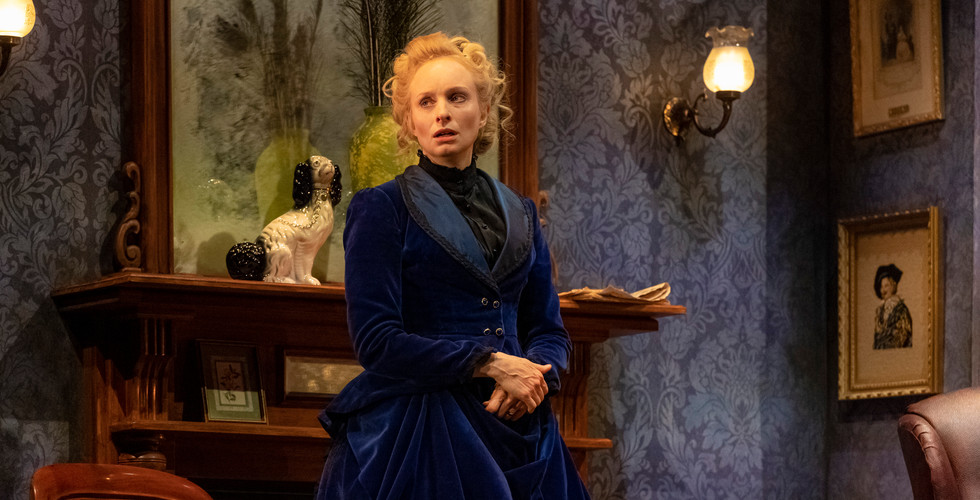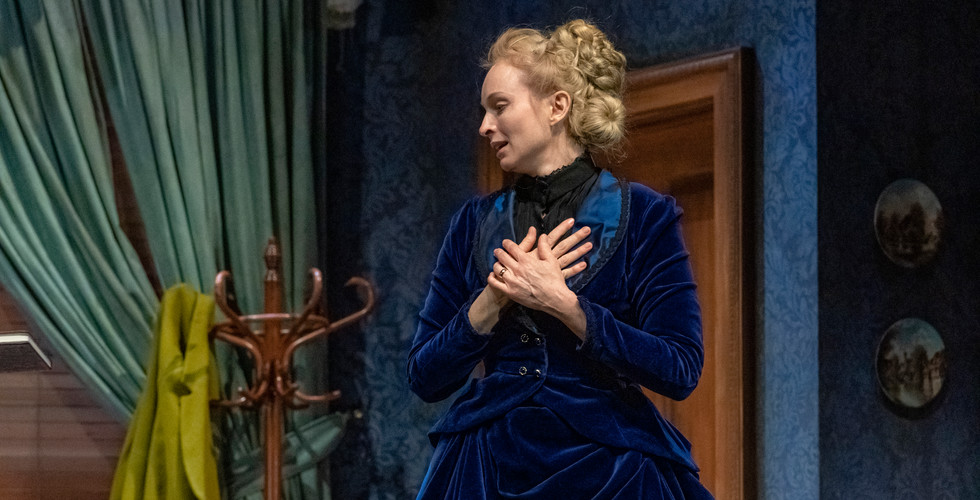Review: Gaslight at Her Majesty’s Theatre, Adelaide
- Theatre Travels

- Sep 11, 2020
- 4 min read
By Lisa Lanzi
As I write this, and indeed as I watched live theatre for the first time in six months, I remain mindful of my privileged position here in Adelaide and feel deeply for friends and colleagues in other parts of Australia, but particularly Melbourne.
A delightful aspect of attending Gaslight was visiting the glorious Her Majesty’s Theatre now that her $66million redevelopment has been unveiled! It was certainly exciting to be amongst other theatre-goers on opening night, albeit with one seat between everyone, and the atmosphere was joyous.
Gaslight, written in 1938 and first produced in 1939, is from the pen of impassioned Marxist Patrick Hamilton. Many of his plays and novels focus a sympathetic eye on impoverished characters and those who are pushed to the outer limits of society. Needless to say, the title of the play has entered our contemporary lexicon to denote forms of psychological manipulation intended to make the victim question their sanity, and is a theme much discussed in regard to domestic violence situations. The play also inspired two films during the 1940’s, both titled Gaslight, directed by Thorold Dickinson then George Cukor.
This 2020 production for The State Theatre Company of South Australia with Catherine Fitzgerald’s astute direction is a brilliant choice to kick-start our theatre-going lives again: not overly demanding and with some comedic hints but expertly acted and staged. In lesser directorial hands, the Victorian formality of the world and words of Gaslight could be far less entertaining. Also, the evocation of dread and potential danger might have been missed. I found myself recoiling from even the relatively restrained scenes of emotional and psychological manipulation but also reflecting that this kind of malevolence (and worse) is still being inflicted on people, mostly women, in our twenty-first century. On the surface we observe the unfolding of a Victorian melodrama/thriller but the writing feels uncannily insightful and accurate in its depiction of an abusive relationship.
Ksenja Logos and Nathan O’Keefe are compelling as central couple Bella and Jack Manningham. Depicting just the right combination of fragility and hysteria Logos brings Bella to life and although we are led to feel for her plight, there are pleasing hints of an underlying strength and keen spirit of survival. O’Keefe imbues Jack with a combination of aloofness, arrogance, condescension and malice as required. The two actors interact with confidence on the tight set and in their detailed period costumes and there is an impression of a delicate choreography as they negotiate each other and their space. The subtle nod to Jack’s controlling tendency is invoked as the character consistently, and with rigid exactness, returns pieces of furniture and props to their ‘rightful’ places.
The entire two acts occur in the one space: a dour and dim Victorian living room over the course of one afternoon and into the late night. The setting reflects the sense of claustrophobia in the Manningham’s relationship with complex patterns and too much furniture in this room where Bella is confined, stitching and taking tea, until she is dismissed, or flees, to her offstage bedroom. Bursting into this inflexible surround comes the retired but still curious Inspector Rough, a colourful counterpoint to that contained atmosphere, who is able to inveigle Bella into some convoluted ‘adventures’, including her first taste of whiskey.
An insightful directorial choice, the male role of rambling Inspector Rough is portrayed by Eileen Darley with panache and presence. Darley is one of Adelaide’s finest actors and it is truly pleasing to witness her return to the mainstage in this elegant characterization. Additionally, Darley opens the play channelling a Vesta Tilley music hall song in front of Her Majesty’s brand new house curtain. Clothed in Tilley’s drag signature of suit and top hat Following in Father's Footsteps is a nice tie-in to the affectations and assignations of Jack Manningham… to be revealed during the play.
Two other characters, housekeeper Elizabeth and bold serving woman Nancy, are essential to the story and add moments of both comedy and awkwardness. Their less desirable social class is highlighted through Jack’s arrogance and his treatment of them but their inner strengths well serve them and the decisions they make concerning the household mystery and mayhem. Both Ellen Freeman (Elizabeth) and Katherine Sortini (Nancy) work seamlessly within the ensemble and both deliver the lower class accents well, as a contrast to the more refined speech of the other characters.
The entire package of design, lighting and music was exquisite and created a believable physical world for the story - not an easy ask in a world where virtual reality has raised our expectations. A special mention too to the State Theatre of SA’s costume and set construction specialists for such intricate work. Ailsa Paterson brought the Victorian-era design elements to life with sumptuous fabrics and style and Nic Mollison’s lighting was a standout giving the expected subtle gas lit appearance and eerie fluctuations. Andrew Howard as composer ably added another level of tension to the ambiance of the experience that was Gaslight.
Proving how eager audiences are for the return of live theatre, this season has sold out. However, one more matinee has now been added so get in fast to see a very satisfying production.
Photo Credit: Chris Herzfeld


























